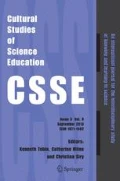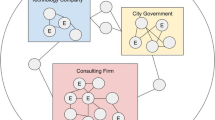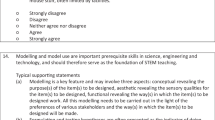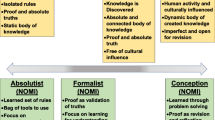Abstract
The book, Engineering in Elementary STEM Education: Curriculum Design, Instruction, Learning, and Assessment, written by Cunningham (Engineering in elementary STEM education: curriculum design, instruction, learning, and assessment, Teachers College Press, New York, 2018), highlights examples of engineering curriculum and pedagogy that Cunningham and her team have developed for the last 15 years. Additionally, she contends that engineering education has the potential to provide underrepresented students with opportunities to experience authentic and relevant STEM education, as well as to help them understand their strengths and abilities as future scientists or engineers. Given the popularity of this book and of the Engineering is Elementary (EiE) curriculum on which it is based, we conducted a critical review essay to more closely examine Cunningham’s claims. Using sociotransformative constructivism, as a theoretical framework, we found Cunningham’s book and supporting EiE curriculum to be rich resources of well-intended concepts and activities for integrating engineering practices in the science classroom. However, the EiE curriculum—like many other curriculum materials in the field—fall short of meeting their equity and diversity goals. In this essay, we argue that some of the EiE curriculum highlighted in Cunningham’s book seem to unintentionally promote colonized thinking, romanticized notions of engineering as a pure human endeavor; and culturally and socially unauthentic scenarios. Our goal is to generate reflection and transformative discussions so that we can elevate this and similar types of popular curriculum. To this end, we also offer suggestions for making STEM curriculum more culturally and socially relevant.
Resumen ejecutivo
El libro, Ingeniería en la Educación Primaria de STEM: Diseño Curricular, Instrucción, Aprendizaje y Evaluación, escrito por Christine Cunningham (2018), destaca ejemplos de planes de estudios de ingeniería y pedagogía que Cunningham y sus colegas han desarrollado durante los últimos 15 años. Cunningham también sostiene que la educación en ingeniería tiene el potencial de proporcionar a los estudiantes marginalizados oportunidades para explorar una educación STEM auténtica y relevante, así como ayudarlos a comprender sus fortalezas y habilidades como futuros científicos o ingenieros. Dada la popularidad de este libro y del plan de estudios de Ingeniería es Elemental (EiE) en el que se basa, realizamos un ensayo de revisión crítico para examinar más de cerca las afirmaciones de Cunningham. Utilizando el constructivismo sociotransformativo, como marco teórico (Rodríguez, 2015a, b; 1998), proponemos que el libro de Cunningham y el plan de estudios EiE que lo apoya son recursos valiosos de conceptos y actividades para integrar con buenas intenciones las prácticas de ingeniería en el aula de ciencias. Sin embargo, los dos--el libro y el plan de estudios EiE--como muchos otros materiales curriculares en el campo, no cumplen con sus objetivos de equidad y diversidad. Por ejemplo, a pesar de que Cunningham alienta a los maestros y estudiantes a adoptar el “fracaso” como un aspecto normal y valioso en el proceso de diseño de ingeniería, su enfoque trivializa las demandas emocionales asociadas con el fracaso al proporcionar a los maestros ejemplos poco prácticos o “alegres” (exageradamente positivos) sobre cómo abordar el problema y los desafíos que ellos y sus estudiantes podrían enfrentar (Loterro-Perdue, 2015; Rodríguez, 2017). Del mismo modo, el plan de estudios EiE incluye imágenes de estudiantes culturalmente diversos, principalmente como “personajes coloridos” a través de sus libros de cuentos y hojas de actividades. Esto se hace sin tratar directamente de aumentar el conocimiento cultural y la conciencia de los estudiantes sobre la gran cantidad de problemas sociales que obstruyen la participación de mujeres y otras personas marginalizadas en STEM (Tolbert et al, 2018). Una vez más, este enfoque trivializa la complejidad de abordar los problemas de equidad y diversidad en las escuelas de hoy. Por lo tanto, aquí proporcionamos algunas sugerencias para evitar estos y otros escollos que se encuentran comúnmente cuando se busca hacer que el plan de estudios sea más culturalmente inclusivo y verdaderamente conectado con la vida de los estudiantes. En resumen, argumentamos que parte del currículo EiE destacado en el libro de Cunningham parece promover involuntariamente el pensamiento colonizado, las nociones románticas de la ingeniería como un esfuerzo humano puro; y escenarios cultural y socialmente poco auténticos. Nuestro objetivo es generar reflexión y discusiones transformadoras para que podamos elevar este y otros tipos similares de currículo popular. Con este fin, también ofrecemos sugerencias para hacer que el plan de estudios (currículo) STEM sea más relevante cultural y socialmente.
핵심 개요
크리스틴 커닝햄 (2018)의 책 ‘초등 스템 (STEM) 교육에서의 공학교육: 교육과정 설계, 교수방법, 학습, 그리고 평가’는 커닝햄과 그녀의 팀이 지난 15년간 개발한 공학 교육과정과 교육방법의 예시들을 소개한다. 커닝햄은 이 책에서 공학교육이 소외 계층 학생들에게 진정한 STEM 교육과 그들이 미래의 과학자와 공학자가 될 수 있는 능력을 깨달을 수 있는 기회를 제공한다고 주장한다. 이 책과 이 책의 바탕이 되는 Engineering is Elementary (EiE) 교육과정이 초등교육에 널리 이용되고 있으므로 , 우리는 비평적 리뷰 에세이를 통해 커닝햄의 주장을 면밀히 점검하고자 한다. 사회변형적 구성주의 (sTc)를 이론적 틀로 이용하여 분석하였을 때 (Rodriguez, 2015a, b; 1998), 커닝햄의 책과 EiE 교육과정은 공학의 실제를 과학 교실에 통합할 수 있는 다양한 활동과 좋은 의도의 교육 개념을 제공한다. 그러나 이 책과 EiE 교육과정은 이 분야 여타의 교육과정들과 비슷하게 형평성과 다양성의 목표를 달성하는 데 부족함이 있다. 예를 들어, 커닝햄은 교사와 학생들이 “실패”를 공학 설계 과정의 자연스럽고 값진 부분으로 받아들이도록 권장하지만, 교사들에게 비실용적이고 단순한 격려 차원의 예시를 제공하는 등 그녀의 접근은 학생들이 겪을 실패와 어려움에 관련된 감정적 요구를 경시할 수 있다 (Loterro-Perdue, 2015; Rodriguez, 2017). 또한 EiE 교육과정은 이야기 책이나 활동지 안에 문화적으로 다양한 학생들의 이미지를 주로 “다채로운 등장인물”로서 포함하고 있다. 이러한 접근은 여성이나 유색인종의 STEM 분야 참여를 저해하는 다양한 사회적 문제에 대한 학생들의 인식을 직접적으로 높이는 시도 없이 이루어진다 (Tolbert et al, 2018). 그리고 이것은 오늘날 학교가 다루는 형평성과 다양성 문제의 복잡성을 경시하는 것이다. 우리는 이 에세이에서 문화적으로 포용적이고 학생들의 삶과 연결된 교육과정을 만들 때 발생할 수 있는 보편적인 위험을 피하기 위한 방법을 제안한다. 요컨대, 커닝햄의 책에서 강조된 몇몇의 EiE 교육과정은 식민지화된 사고, 공학에 대한 미화된 개념, 문화적, 사회적으로 신뢰할 수 없는 시나리오 등을 의도치 않게 제안할 수 있음을 다룬다. 우리의 목표는 변화를 위한 재고와 논쟁을 통해 EiE 교육과정은 물론 광범위하게 적용되고 있는 교육과정들의 질을 향상시키는 것이다. 이를 위해 우리는 STEM교육과정을 문화적, 사회적으로 더욱더 적절한 교육과정으로 만들기 위한 대안을 제시한다.
Similar content being viewed by others
References
Bakhtin M. M. (1986). Speech genres and other late essays (C. Emerson & M. Holquist, Ed.). Austin: University of Texas Press Slavic.
Banilower, E. R., Smith, P. S., Malzahn, K. A., Plumley, C. L., Gordon, E. M., & Hayes, M. L. (2018). Report of the 2018 NSSME+. Chapel Hill: Horizon Research Inc.
Boston Museum of Science. Engineering is Elementary Team. (2007). Suman crosses the Karnali river: A geotechnical engineering story. Boston: Museum of Science.
Conner, C. D. (2005). A people’s history of science: Miners, midwives, and “low mechanicks”. New York: Nation Books.
Cunningham, C. M. (2018). Engineering in elementary STEM education: Curriculum design, instruction, learning, and assessment. New York: Teachers College Press.
Gunckel, K. L., & Tolbert, S. (2018). The imperative to move toward a dimension of care in engineering education. Journal of Research in Science Teaching, 55, 938–961. https://doi.org/10.1002/tea.21458.
Koschmann, T. (1999). Toward a dialogic theory of learning: Bakhtin’s contribution to understanding learning in settings of collaboration. In Proceedings of the 1999 conference on computer support for collaborative learning, pp. 308–313. https://dl.acm.org/doi/abs/10.5555/1150240.1150278
Loterro-Perdue, P. S. (2015). The engineering design process as a safe place to try again: Responses to failure by elementary teachers and students. Paper presented at the Annual Meeting of the National Association for Research in Science Teaching. Chicago. Retrieved from https://www.eie.org/sites/default/files/research_article/research_file/lottero-perdue_2015_responses_to_design_failure.pdf
Macfarlane, A., Manning, R., Ataria, J., Macfarlane, S., Derby, M., & Clarke, T. H. (2019). Wetekia kia rere: The potential for place-conscious education approaches to reassure the indigenization of science education in New Zealand settings. Cultural Studies of Science Education, 14, 449–464. https://doi.org/10.1007/s11422-019-09923-0.
Martinez, M. E. (2006). What is metacognition? Phi Delta Kappa, 87(9), 696–699. https://doi.org/10.1177/003172170608700916.
May, S., & Sleeter, C. E. (Eds.). (2010). Critical multiculturalism: Theory and praxis. New York: Routledge.
Morales-Doyle, D. (2019). The aspirin unit: Confronting a hostile political context through chemistry curriculum. Cultural Studies of Science Education. https://doi.org/10.1007/s11422-019-09932-z.
National Research Council. (2012). A framework for K-12 science education: Practices, crosscutting concepts, and core ideas. Washington, DC: National Academy Press.
NGSS Lead States. (2013). Next generation science standards: For states, by states. Washington, DC: The National Academies Press.
Pouliot, C. (2019). Speaking out about inequities. Cultural Studies of Science Education, 14, 293–301. https://doi.org/10.1007/s11422-019-09912-3.
Rodriguez, A. J. (1998). Strategies for counterresistance: Toward sociotransformative constructivism and learning to teach science for diversity and for understanding. Journal of Research in Science Teaching, 35(6), 589–622. https://doi.org/10.1002/(SICI)1098-2736(199808)35:6%3c589:AID-TEA2%3e3.0.CO;2-I.
Rodriguez, A. J. (2015a). Managing sociocultural and institutional challenges through sociotransformative constructivism: A longitudinal case study of a high school science teacher. Journal of Research in Science Teaching., 52(4), 448–460. https://doi.org/10.1002/tea.21207.
Rodriguez, A. J. (2015b). What about a dimension of engagement, equity, and diversity practices? a critique of the next generation science standards. Journal of Research in Science Teaching, 52(7), 1031–1051. https://doi.org/10.1002/tea.21232.
Rodriguez, A. J. (2017). How do teachers prepare for and respond to students’ evoked emotions when addressing real social inequalities through engineering activities? Theory Into Practice, 56(4), 263–270. https://doi.org/10.1080/00405841.2017.1350497.
Rodriguez, A. J. (under review). How to avoid seven common (but seldom discussed) STEM curriculum pitfalls: Making STEM more culturally and socially relevant. Manuscript submitted for publication.
Rodriguez, A. J., & Morrison, D. (2019). Expanding and enacting transformative meanings of equity, diversity and social justice in science education. Cultural Studies in Science Education, 14, 265–281. https://doi.org/10.1007/s11422-019-09938-7.
Rodriguez, A. J., & Zozakiewicz, C. (2010). Facilitating the integration of multiple literacies through science education and learning technologies. In A. J. Rodriguez (Ed.), Science education as a pathway to teaching language literacy (pp. 23–45). Rotterdam: SENSE Publishing.
Rodriguez, A. J., Zozakiewicz, C., & Yerrick, R. (2005). Using prompted praxis to improve teacher professional development in culturally diverse schools. School Science and Mathematics Journal, 105(7), 352–362.
Rynearson, A. M. (2016). From mechanic to designer: Evolving perceptions of elementary students over three years of engineering instruction (Doctoral dissertation). Available from ProQuest Dissertations & Theses database. (Purdue University No. 10179099).
Tank, K. M. (2014). Examining the effects of integrated science, engineering, and nonfiction literature on student learning in elementary classrooms (Doctoral dissertation). Available from ProQuest Dissertations & Theses database. (University of Minnesota No. 3630271).
Tolbert, S., Schindel, A., & Rodriguez, A. J. (2018). Relevance and relational responsibility in justice-oriented science education research. Science Education, 102(4), 645–877. https://doi.org/10.1002/sce.21446.
Vygotsky, L. S. (1978). Interaction between learning and development (M. Lopez-Morillas, Trans.). In M. Cole, V. John-Steiner, S. Scribner, & E. Souberman (Eds.), Mind in society: The development of higher psychological processes (pp. 79–91). Cambridge: Harvard University Press.
Yonow, T., Ramirez-Villegas, J., Abadie, C., Darnell, R. E., Ota, N., & Kriticos, D. J. (2019). Black Sigatoka in bananas: Ecoclimatic suitability and disease pressure assessments. PLoS ONE, 14(8), e0220601. https://doi.org/10.1371/journal.pone.0220601.
Zozakiewicz, C., & Rodriguez, A. J. (2007). Using sociotransformative constructivism to create multicultural and gender inclusive classrooms: An intervention project for teacher professional development. Educational Policy, 21(2), 397–425. https://doi.org/10.1177/2F0895904806290126.
Author information
Authors and Affiliations
Corresponding author
Additional information
Publisher's Note
Springer Nature remains neutral with regard to jurisdictional claims in published maps and institutional affiliations.
Lead Editor: L. Avraamidou.
Rights and permissions
About this article
Cite this article
Rodriguez, A.J., Shim, S.W. Addressing critical cross-cultural issues in elementary STEM education research and practice: a critical review essay of Engineering in Elementary STEM Education. Cult Stud of Sci Educ 16, 1–17 (2021). https://doi.org/10.1007/s11422-020-09993-5
Received:
Accepted:
Published:
Issue Date:
DOI: https://doi.org/10.1007/s11422-020-09993-5




